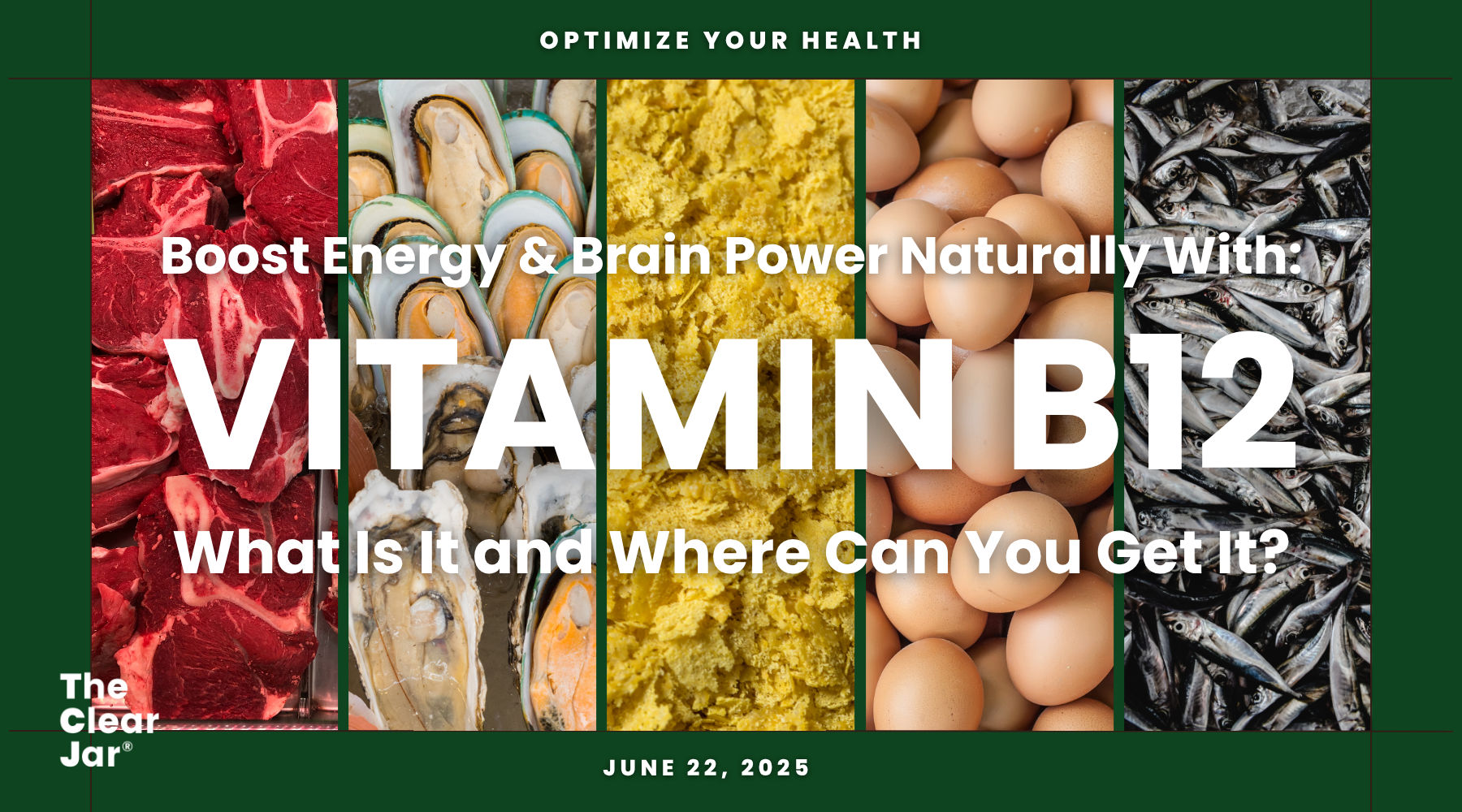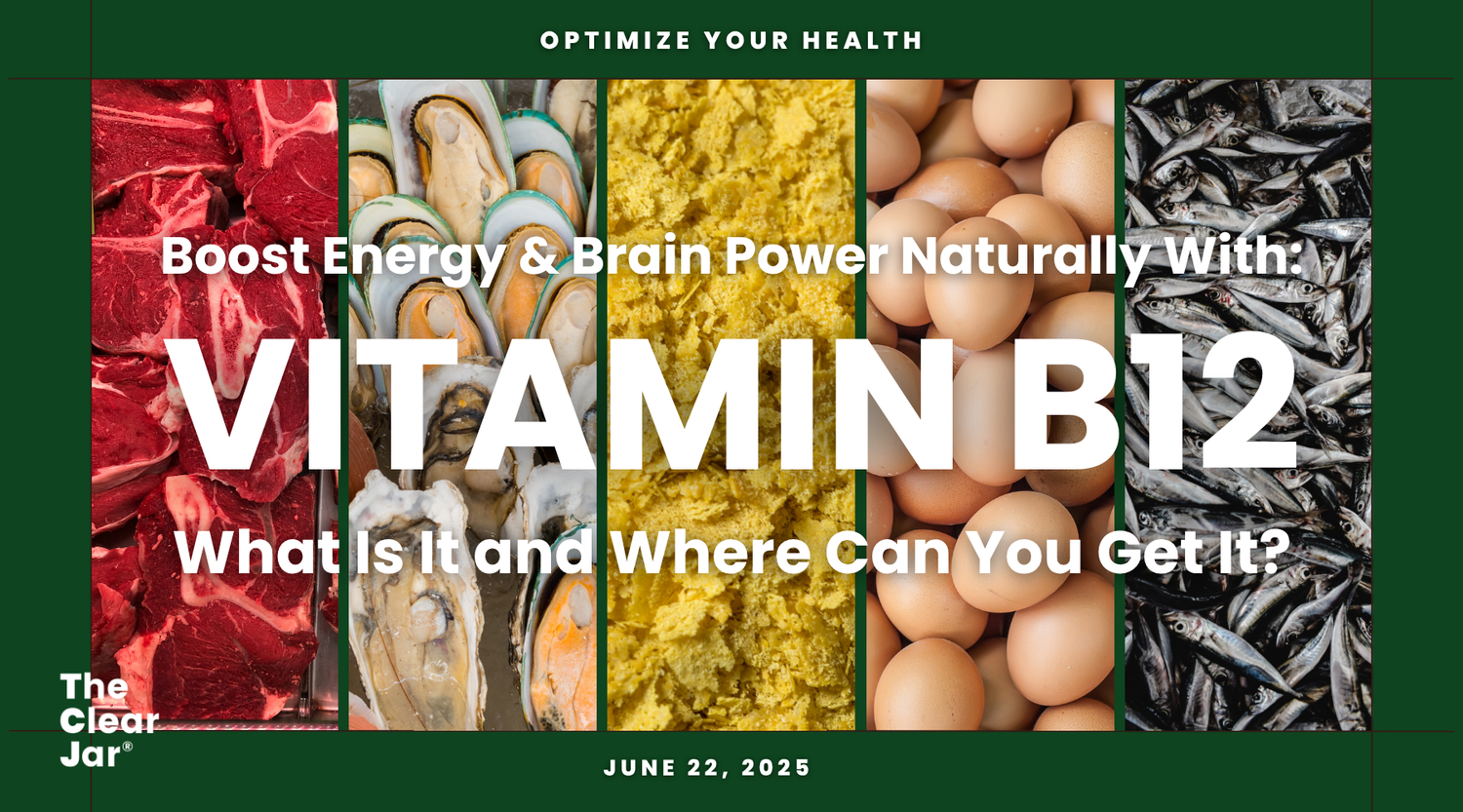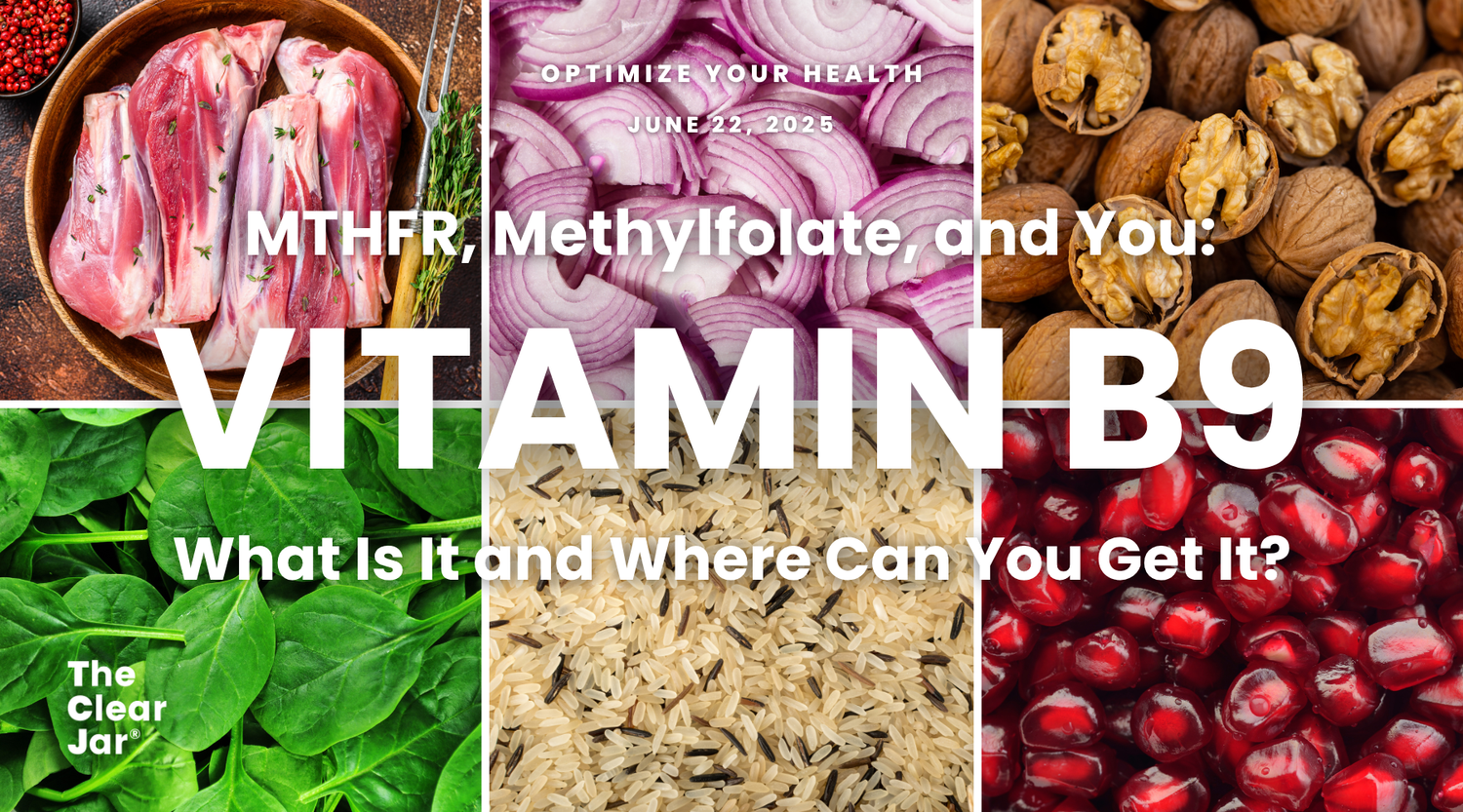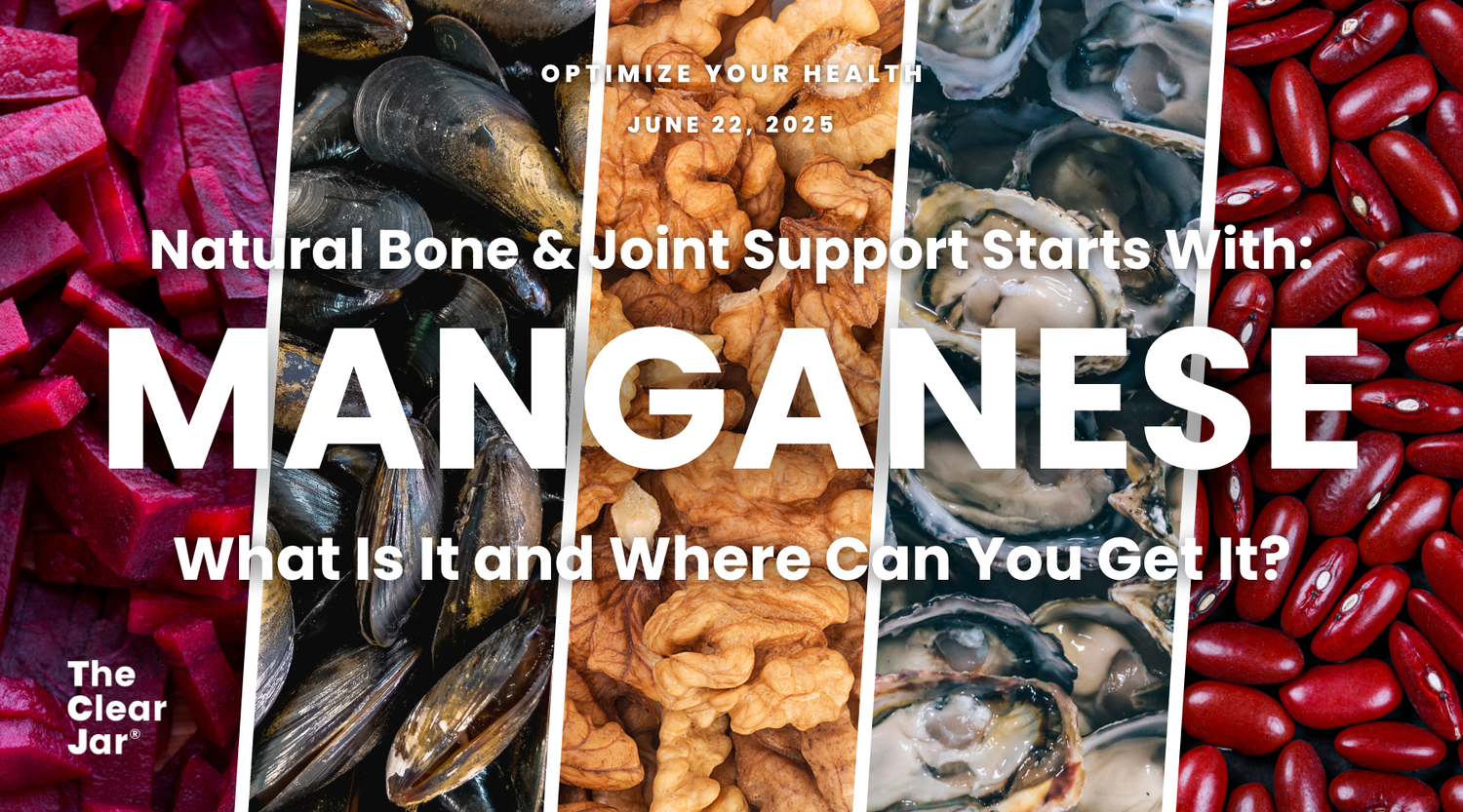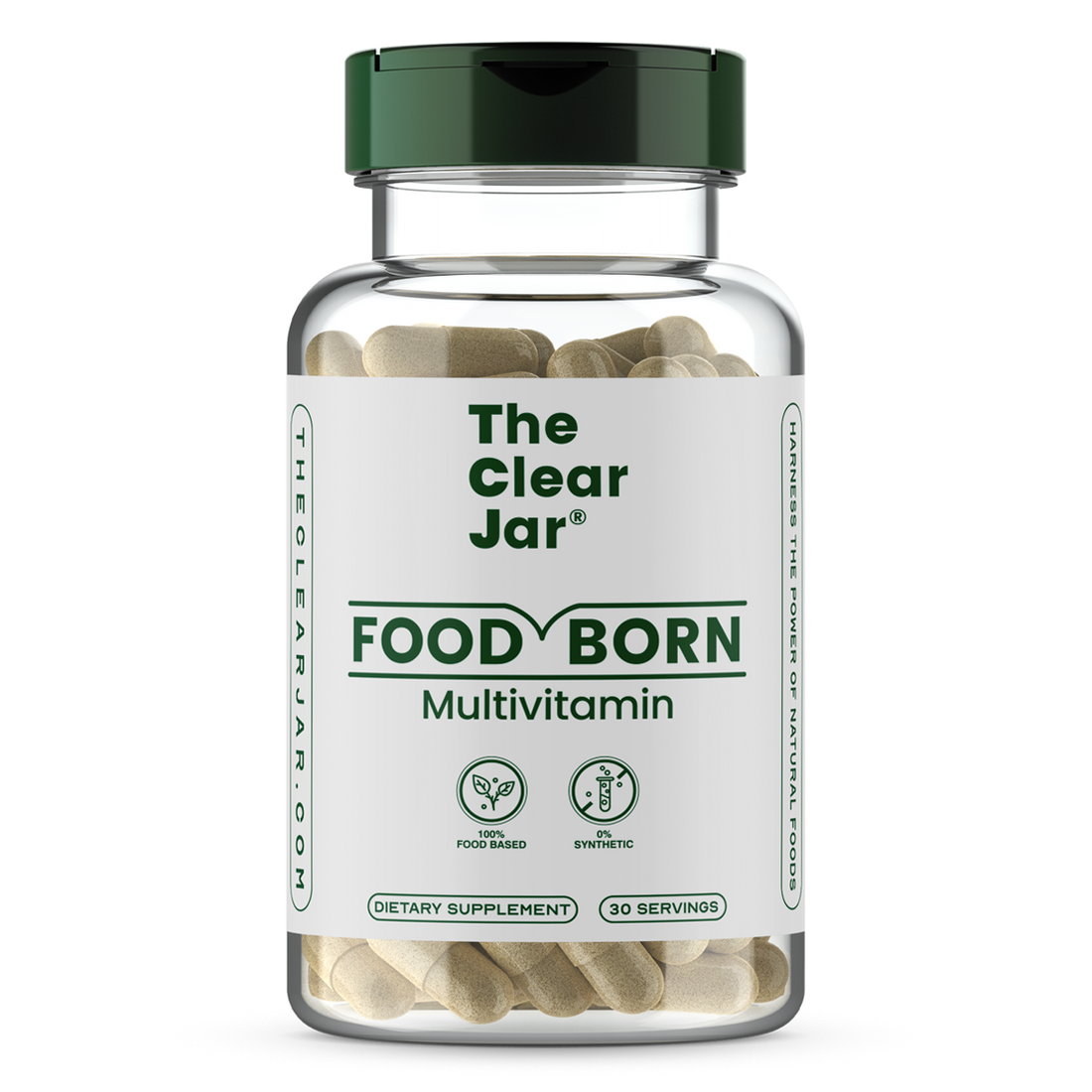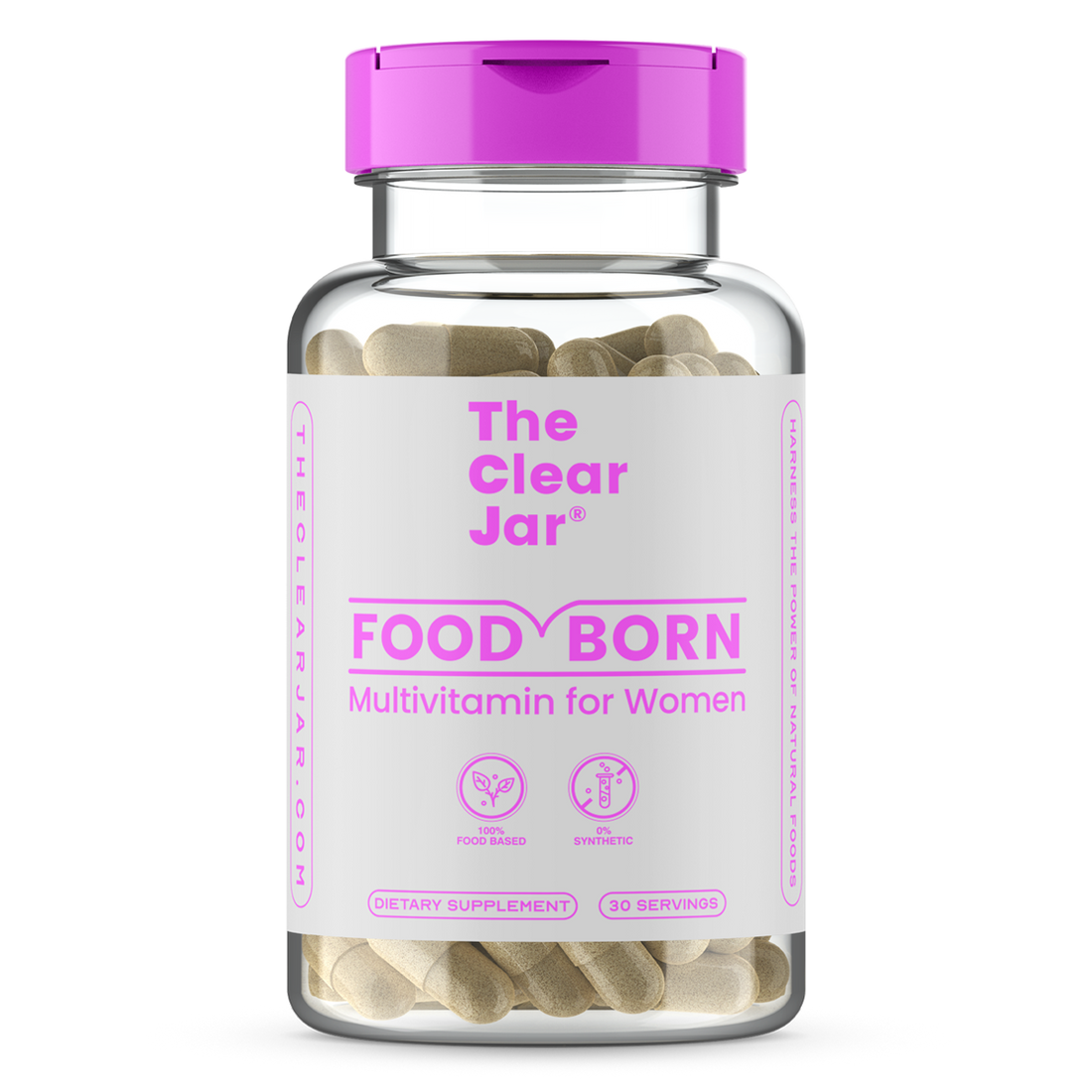Curious about what vitamin B12 is and why it’s so important for your health? Here we delve into its crucial roles in the body, where to get it, and who should consider supplementing their diet with natural, food-born vitamins.
Content Outline
- What is Vitamin B12?
- What is the function of Vitamin B12 in the human body?
- Vitamin B12 forms: Which is the active form?
- Vitamin B12-rich foods
- Vitamin B12 recipe: Vegan carbonara with veggies
- Vitamin B12 supplements
- Why buy food-born vitamins?
What is Vitamin B12?
Vitamin B12, also known as cobalamin, is an essential water-soluble vitamin that is crucial for many functions in the human body. It’s naturally present in animal-based foods, such as meat, poultry, eggs, and dairy products, but it’s also used to fortify non-dairy alternatives and cereals.
Your body needs vitamin B12 to make healthy red blood cells, nerve cells, and DNA. Without enough vitamin B12, you are at risk of megaloblastic anaemia, a condition that causes red blood cells to become abnormally large and immature, resulting in a myriad of symptoms, including:
- shortness of breath
- weakness
- rapid heartbeat
- lightheadedness1
Most people will get all the vitamin B12 they need from their diet, but some people are at an increased risk of deficiency, such as those who are increasing in age and anyone who follows a Vegan diet. It’s estimated that around 6% of people aged 60 and above are vitamin B12 deficient, while 20% are on the cusp of deficiency2.
What is the function of Vitamin B12 in the human body?
Vitamin B12 has several key roles in the body, including supporting the function of nerve cells and the production of healthy red blood cells and nerve cells. Most people require the recommended daily intake of 2.4 micrograms (MCG) per day3 to maintain optimal function and to maintain:
-
Healthy red blood cell production: Vitamin B12, alongside folate (B9) and iron, is critical for the production of new red blood cells, a process called erythropoiesis. Vitamins B9 and B12 are essential for the proliferation of the precursors to red blood cells in the bone marrow, called erythroblasts4. Without adequate amounts of these nutrients, the cells may not develop normally, increasing the risk of anaemia.
-
Nerve cell health: B12 is a key component in the production of myelin, the protective sheath that surrounds nerve cells, which helps to maintain nerve function and prevent neurological issues5. Research shows that a deficiency in B12 is linked to worsened sensory and motor peripheral nerve function, including greater insensitivity to light and touch6.
-
DNA synthesis: DNA is all the genetic material found inside your cells and contains all the information required to build and maintain a living organism. DNA is inherited from your parents, but it requires vitamin B12 during its production. B12 is involved in the transfer of methyl groups that are needed for DNA methylation and nucleotide synthesis, critical for DNA replication and transcription7.
-
Cognitive function: Deficiency in vitamin B12 can cause various cognitive impairments, like brain fog, depression, and cognitive decline. Some research shows that vitamin B12 supplementation can improve cognitive function in people who are B12 deficient8.
-
Bone health: Research suggests that vitamin B12 supports bone health and that deficiency can increase the risk of poor bone health and the development of osteoporosis9.
Vitamin B12 forms: Which is the active form?
There are two metabolically active forms of vitamin B12, but there are also two further forms which become biologically activated once they are converted to the two active forms. The most biologically active form of vitamin B12 is methylcobalamin10. It is readily used by the body and has numerous functions.
Interestingly, methylcobalamin has been shown to have painkilling or analgesic effects in experimental and clinical studies, particularly for back pain, nerve pain, diabetic neuropathic pain, and neck pain. It works by promoting injured nerve regeneration, and could have potential for treating peripheral neuropathy safely and effectively in the future11.
Other forms include:
-
Adenosylcobalamin: Another biologically active form of vitamin B12 that acts as a coenzyme for methylmalonyl-CoA mutase enzyme which has important roles in energy production11.
-
Cyanocobalamin: A synthetic form of vitamin B12, which is usually given in supplement form to people who are B12 deficient. Once in the body, it is converted into the active form.
-
Hydroxocobalamin: Another manufactured form of B12 that is converted to the active form once in the body. The medical profession commonly uses it to correct B12 deficiency12.
Vitamin B12-rich foods
Vitamin B12 is predominantly found in animal-based food sources, including:
- red meat: beef, lamb, and pork
- poultry: chicken and turkey
- shellfish: clams and prawns
- fish: sardines, mackerel, cod, and tuna
- eggs
- dairy products: milk, cheese, and yoghurt13
However, it is also added to certain foods to fortify their vitamin B12 status and to help certain vulnerable groups improve their intake. Fortified foods include:
- breakfast cereals
- plant-based milks: oat, almond, soy, rice
- nutritional yeast
Vitamin B12 recipe: Vegan carbonara with veggies
If you're following a vegan diet, this creamy carbonara with vegetables is a perfect way to boost your Vitamin B12 intake, thanks to the use of fortified plant-based milk and nutritional yeast. However, if you are not following a vegan diet, you can easily add animal sources such as meat(bacon or chicken), eggs, or cheese, or switch the plant-based milk with cow’s milk to further increase the B12 content. This versatile recipe can be customized to suit your dietary preferences while providing a rich, creamy dish that's both satisfying and nutritious!
Ingredients
- 200g whole wheat pasta
- 240ml fortified plant-based milk (soy, oat, or almond)
- 45g nutritional yeast (fortified with B12)
- 15ml olive oil
- 1 garlic clove, minced
- 15ml lemon juice
- 75g frozen peas (and/or any other vegetable of choice, such as spinach, zucchini, or mushrooms)
- 30g sun-dried tomatoes (optional, for added flavor)
- Salt and pepper to taste
- Fresh parsley (optional, for garnish)
- 30g vegan bacon bits or tempeh (or a meat alternative) (for that carbonara-style texture)
Method
- Cook the pasta according to the packet instructions. Then, drain and set aside for later.
- While the pasta is cooking, heat the olive oil in a large pan over medium heat. Add the minced garlic and sauté for 1 to 2 minutes until fragrant.
- Add your choice of vegetables and cook for another 3 to 4 minutes until soft.
- In another medium pan, pour in the fortified plant-based milk and bring to a gentle simmer. Stir in the nutritional yeast, lemon juice, salt, and pepper, whisking until the sauce thickens and becomes creamy (about 3 to 4 minutes).
- Add in the vegetables, sun-dried tomatoes, vegan bacon bits or crumbled tempeh, and stir.
- Toss in the cooked and drained pasta into the sauce, mixing thoroughly so it is well-coated.
- Serve straight away, garnished with a sprig of fresh parsley.
This delicious vegan carbonara combines the rich creaminess of the sauce with the crunch and smokiness of vegan bacon bits or tempeh, along with the goodness of vegetables like peas and sun-dried tomatoes. It’s a nutrient-dense meal that’s full of vegan-friendly B12 or you can add in some animal sources, if you’re not following a vegan or vegetarian diet.
Vitamin B12 supplements
Vitamin B12 is a common nutritional deficiency, particularly in wealthier countries among the elderly14. So, supplementation is crucial for people who may not be able to get enough vitamin B12 from their diet. While most people will get all they need from the food they eat, there are situations where this may not be possible.
Groups who would benefit most from vitamin B12 supplementation:
-
Vegans and vegetarians
Because vitamin B12 is mostly found in animal-based foods, those following a strict vegan or vegetarian diet are at an increased risk of deficiency. For example, some figures show that between 21 and 85% of vegetarians are B12 deficient15. Although some foods are fortified with vitamin B12, such as plant milks, cereals, and nutritional yeast, it can still be a challenge to meet the daily recommended intake through diet alone.
-
The elderly
With increasing age comes a reduced ability to absorb vitamin B12. Older adults, especially those over the age of 50, are more likely to experience a deficiency. One study found that 8.8% of people aged between 69 and 97 were B12 deficient16. While other estimates suggest that 20% of people over 60 have a vitamin B12 deficiency, this could be as high as 40%16.
-
People with malabsorption issues
Some health conditions can affect the gastrointestinal tract, such as celiac disease and Crohn’s disease, which can interfere with the body’s ability to absorb vitamin B12 from food17. Equally, anyone who has had weight loss surgery or certain types of gastric surgery may have reduced capacity to properly absorb nutrients.
-
People with a poor diet or inconsistent food intake
People who have a limited diet, such as those who follow a restrictive eating pattern, may not consume enough vitamin B12-rich foods regularly. This can include people recovering from illness, elderly individuals with limited access to food, or those with eating disorders.
Vitamin B12 supplements are available in several forms, which vary in their bioavailability and absorption. Here are some of the common types:
|
Form |
Examples |
Notes |
|
Oral supplements (tablets, capsules, lozenges, chewable tablets) |
cyanocobalamin |
These are the most common vitamin B12 supplements and often contain synthetic cyanocobalamin. Tablets or capsules are widely available and are often the first choice for supplementation. |
|
Vitamin B12 injections |
hydroxocobalamin chloride |
Injections are usually reserved for people with severe deficiency or malabsorption issues. They are typically given by healthcare professionals and deliver B12 directly into the bloodstream for rapid absorption. |
Which Vitamin B12 supplement is best?
The choice of vitamin B12 supplement that is best for you will depend on several factors, such as:
- Dietary preferences
- Health conditions
- Ease of absorption
Generally, if you have no absorption issues and prefer a simple supplementation approach, oral supplements like tablets and capsules may be the best option.
For the most bioavailable version, food-born vitamins like those from The Clear Jar contain methylcobalamin and are derived directly from natural sources.
Why buy food-born vitamins?
Vitamin B12 is an essential nutrient that supports red cell production, energy levels, and brain and nerve health. It is naturally available in a range of foods, but is almost exclusive to animal-based sources, except for some fortified foods like plant milks, cereals, and nutritional yeast. For this reason, some groups are at an increased risk of deficiency, particularly vegans, vegetarians, and the elderly, and may benefit from supplementation. However, it is difficult to know which supplement is best for you.
If you want a bioavailable option that is 100% naturally with no artificial additives, then consider a food-born multivitamin from The Clear Jar to boost your body’s nutrient levels.
When you buy from us, you can be assured that they are:
-
non-toxic
-
are 100% food-based
-
are additive-free
-
are cost-effective
Written by: Leanne Edermaniger MSc


